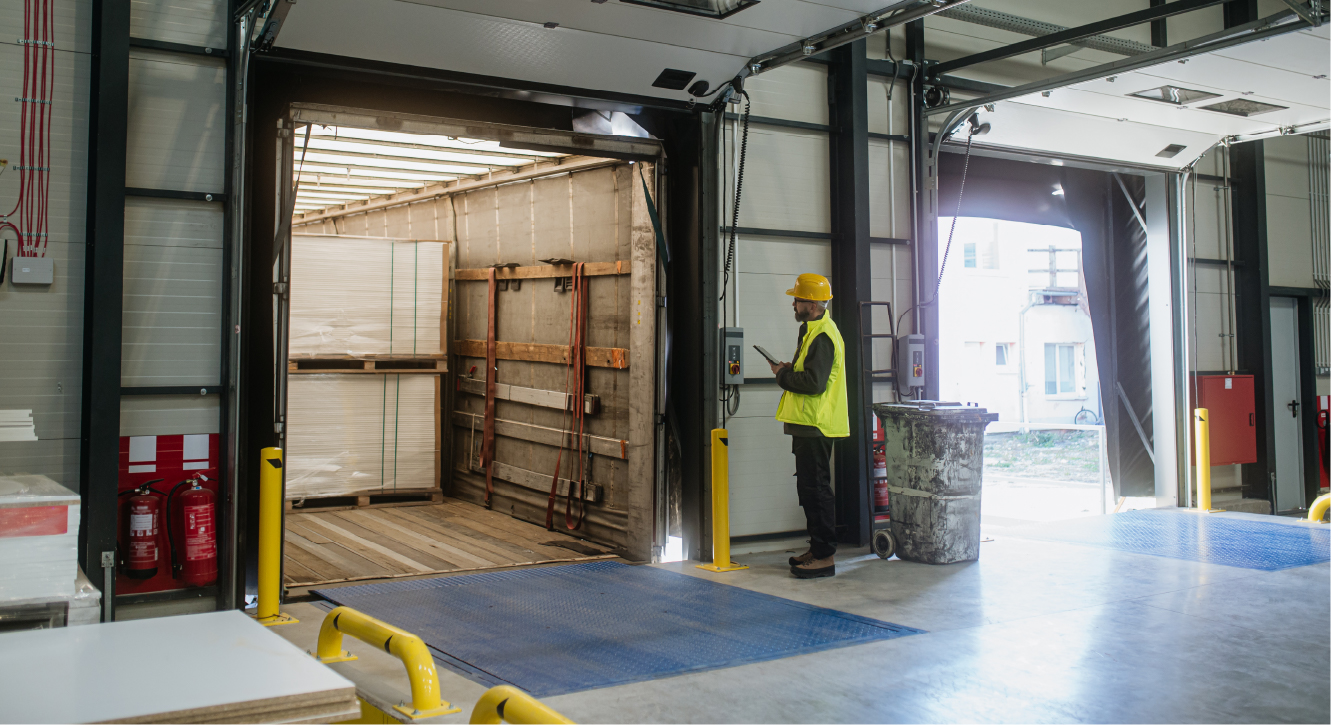- SolutionsBack to Knowledge CenterDrayage Supply Chain Consulting
What Does FOB Mean? How Can FOB Terms Affect Your Company?
Transportation Insight clients and prospects often ask the meaning of the acronyms. BOL, BOPIS, OTIF. There’s a lot of questions around shipping terms like FOB Origin, Freight Collect.

During a site visit with a prominent shipper a high-level purchasing person called it fob (rhyming with “bob”). That highlights a need to understand how this often-misused term is defined.
First of all, FOB – or F.O.B. – stands for Free On Board. It is the point in the supply chain where the seller relinquishes ownership, and the buyer accepts ownership of products purchased in a specific transaction. Every vendor/client relationship should have the FOB terms specified in their PO (that’s purchase order) purchase terms.
Along with purchase terms, shipping terms are equally as critical to your logistics carrier management best practices. Identifying both terms will determine ownership, risk, and logistics cost.
Here is more detail about FOB, beginning with common transportation terms you may encounter. We will also explore steps you can take to deal with FOB issues at your business.
FOB Terms to Know and Understand
Making sure the FOB terms suit your company’s needs is a powerful way to gain a competitive advantage in your day-to-day when shipping and accepting goods.
FOB Terms: FOB Origin, Freight Collect
“FOB Origin” refers to the legal fact that the buyer assumes title of the goods the moment the freight carrier picks up and signs the bill of lading (BOL) at the origin pick-up location.
“Freight Collect” refers to the legal fact that the buyer is responsible for all freight charges. The buyer also assumes all risks of transportation. That means they are responsible for filing claims in the case of loss or damage.
FOB Terms: FOB Origin, Freight Prepaid
“Origin” refers to the legal fact that buyer takes ownership at the time of carrier pickup.
“Freight Prepaid” refers to the legal fact that the seller accepts responsibility for all freight charges and freight claims exposure.
FOB Terms: FOB Destination, Freight Collect
“FOB Destination” refers to the legal fact that the seller retains title and control of the goods until they are delivered. The seller selects the carrier and is responsible for the risk of transportation and filing claims in case of loss or damage.
“Freight collect” refers to the legal fact that the buyer is responsible for the freight charges.
FOB Terms: FOB Destination, Freight Prepaid
“Destination” refers to the legal fact that the seller retains ownership until a claim-free delivery is affected.
“Freight prepaid” refers to the legal fact that the seller is responsible for all freight charges.
How can FOB Terms Affect Your Company?
Failure to properly manage and assess risk regarding purchase and transportation terms can affect any company’s bottom line.
One distributor receives many shipments from various vendors on a daily basis. The policy on this company’s dock is that personnel refuse any order that has the slightest sign of damage. The hassle involved with filing a claim or ordering replacement parts for potential damages motivates this blanket policy to refuse these shipments.
When you think about legal liability, you need to know your FOB terms with vendors. In this case, the vendor with most refused shipments set “F.O.B. Origin, Freight Prepaid” terms. This meant that even though the vendor was paying the freight transportation cost, the distributor owned the freight from the time the shipment was tendered to the carrier. That puts responsibility of loss or damage with the receiver. By refusing these shipments, the distributor was returning something that it actually owned.
Fortunately for this distributor the vendor had agreed to accept the goods back into inventory, even though they had no legal obligation.
With this new awareness, the distributor rectified the problem by adjusting the purchase terms for future orders.
Having a third-party logistics provider to review your agreements, audit your freight invoices and explain your day-to-day business procedures to each of your vendors provides insight and clarity to all involved. Each department may not know what the other is doing in your organization, but your logistics provider can facilitate the best transition of goods for your company.
How Do You Handle FOB Issues?
A late shipment, a breakdown, a Bill of Lading filled out improperly – no matter what it is—a circumstance can arise to challenge the best working dynamic in logistics.
When an incident occurs in the shipping and receiving of goods, it usually causes some level of disruption. With that in mind, it is very important to have proper documentation, especially in regards to FOB terms.
If you are a shipper, make sure the FOB terms are clearly defined, understood and established to properly reflect the needs of the business relationship. You may want your customer to be FOB Origin so they own the goods when they leave your door. Alternately, you may want to own the goods until they are delivered intact. In fact, that is a great customer service selling point. The same holds true with companies that receive a lot of goods.
Knowledge is powerful, and having a great business relationship with your vendors can overcome multiple barriers. The personal relationship will provide flexibility for difficult situations.
What Does FOB Mean Around the World?
According to the International Chamber of Commerce (ICC) standard trade definitions known as Incoterms, FOB means Free on Board. In 2010, the ICC altered the definition to state the seller must load the goods on board the vessel nominated by the buyer.
The cost and risk are divided when the goods are actually on board of the vessel. The seller is responsible for the goods to be cleared for export. The term is applicable for maritime and inland waterway transport only but NOT for multi-modal sea transport in containers.
The buyer must instruct the seller on the details of the vessel and the port where the goods are to be loaded, and there is no reference to, or provision for, the use of a carrier or forwarder. Free on Board is a term has been greatly misused over the last three decades ever since Incoterms 1980 explained that FCA should be used for container shipments.
When developing any business agreement, to avoid a dispute, the buyer should seek to specify in the contract of sale what costs will be borne by the seller and what costs fall on the buyer.
According to the rules established by the ICC, where the buyer has given an indication of the loading point but later wants to change these instructions, the seller is not obliged to cover the expenses of transferring the goods to a new loading point, provided the seller has acted in line with the buyer´s first instructions and the buyer´s new notice arrived too late for the seller to comply without extra cost. It is essential in the contract to make it clear when ownership passes from the seller to the buyer.
Each situation differs depending on place, parties, industry, applicable laws and relevant customs and usages. General guidance cannot be expected to determine an outcome in a dispute.
Having a trusted partner with international trade expertise can relieve the headaches and provide insight into future growth opportunities. Talk to one of our experts to learn more.
About Author:
Transportation Insight
Transportation Management SolutionsTransportation Insight (TI) is a leading provider of supply chain and logistics solutions, helping North American manufacturers, retailers and distributors optimize transportation, reduce costs and improve operational efficiency for more than 25 years. Offering expertise in managed transportation, freight audit and payment, parcel optimization and data-driven analytics, TI partners with clients to streamline supply chains, enhance visibility and drive strategic growth.
More Blogs








On this article:
Sign up for the TI newsletter to get exclusive updates.